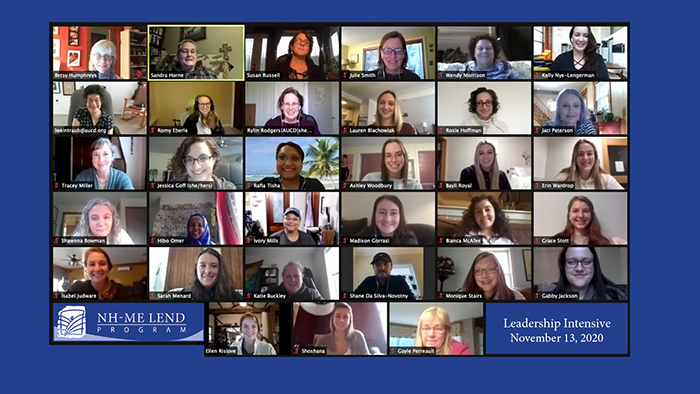
LIVED EXPERIENCE AND LEADERSHIP: SELF ADVOCATES AND FAMILY MEMBERS IN THE DISABILITY RIGHTS MOVEMENT
01/11/2021

|
| NH-ME LEND logo, Rylin Rodgers, Liz Weintraub and Lauren Blachowiak |
Each fall, the NH-ME LEND Program conducts a leadership intensive on the history of disability. This year, the session was reworked to cover the history of the disability movement. Trainees were asked to watch the 2020 documentary, Crip Camp, and to reflect upon how this innovative inclusive summer camp for teenagers with disabilities during the 1970's helped to mobilize a generation of disability rights activists and energize the independent living movement.
As part of the intensive, NH-ME LEND also convened a panel of three guest speakers, all from the Association of University Centers on Disabilities (AUCD), to talk about their roles as family members or self advocates in the current disability rights movement.
Rylin Rodgers, AUCD's Director of Public Policy, works on federal policy and legislative issues that affect people with developmental disabilities and their families. "I identify as a person with a disability. I was born in 1975, which is the same year that the first special education federal law was passed. That turned out to be transformative to my lived experience because I'm a person that's dyslexic. I was among the first generation of students who benefitted from special education and a free and appropriate public education (FAPE)." Rodgers reported that she used accommodations all through grades K-12 and received some accommodations in college.
Rodgers was interested in attending law school to become a civil rights lawyer and decided to have her first child. Her son was born with significant disabilities and that dramatically altered her life path. "My children are [now] 22 and 20. [T]hey were the generation born before the Affordable Care Act, at a time when being born with a disability was being born with a pre-existing condition. And in both cases, they capped our private insurance lifetime limit before [my children] exited the neo-natal intensive care unit."
Rodgers' family did not qualify for Medicaid because they were over income living on one public school teacher's salary. "We were [living] in a state where the Medicaid waiver waitlist was over 15 years and so we were stuck," she said. "And that led to an experience of poverty for over a decade and then significant medical debt. And it's the lived experience as a parent that really brought me into the disability community because I was very personally impacted by how policy wasn't working for families like mine."
Liz Weintraub, a long-time disability advocate, is AUCD's Senior Advocacy Specialist and a full-time member of the policy team. When her parents asked her what she wanted to do for a living, Liz replied, "I want to be a lobbyist." Looking back, Weintraub says, "I'm not even sure I knew exactly what a lobbyist was, but I wanted to be doing exactly what I'm doing today."
Today she hosts Tuesdays With Liz: Disability Policy For All, a weekly video series highlighting current issues in disability policy, produced by AUCD. "The reason why Tuesdays with Liz has become a reality is that I wanted to be sure my friends and I could understand what a policy was and what HCBS (Home & Community Based Services) is or what The ABLE Act (Achieving a Better Life Experience Act) is or what The Transformation to Competitive Employment Act is," she said.
Lauren Blachowiak is AUCD's 2020-2021 Disability Policy Fellow and also a sibling. "I have a younger sister with Down syndrome. We're very close and always have been. Liz talked about a moment from her childhood when she told her parents she wanted to be a lobbyist. I had a similar interaction at about 10 years old where my parents talked to me [and said]: 'Your sister has a disability and here's what that means.' I remember being confused about why we were even talking about it. Why did it matter? But looking back on it, obviously it did matter."
While working on her master's degree in special education at Vanderbilt University, Blachowiak served as a Susan Gray Teaching Fellow at the research-oriented school on Vanderbilt's campus and developed research on a sibling-mediated language intervention for young children with Down syndrome.
"I studied early childhood special education and was a schoolteacher in [Washington] DC for two years and was able to work with young children with hearing impairment in an inclusive classroom," said Blachowiak. "The experience of working in an inclusive classroom where about 15% of our students had a hearing impairment was also very formative and important for me. We were able to educate everybody and meet everybody's needs and form a cohesive community."
The three panelists were asked to identify where the energy and focus of the disability movement is today.
"I would encourage us to think about the priorities of our country," said Rodgers. "Getting the virus under control and economic recovery. Then, what can we do as a disability community to make sure both of those efforts include people with disabilities and meet the needs of people with disabilities."
"All means all," said Weintraub. "We have been left out of discussions; we meaning people with disabilities. If we don't speak up, who will? Justice for all. There are 61 million people with disabilities in this country. We need to be included in everything."
"Lived experience matters," said Blachowiak. "Everyone can have a part to play in this."
Panelists' photos courtesy of the Association of University Centers on Disabilities.

Larger photo is Zoom screenshot from the NH-ME LEND Leadership Intensive